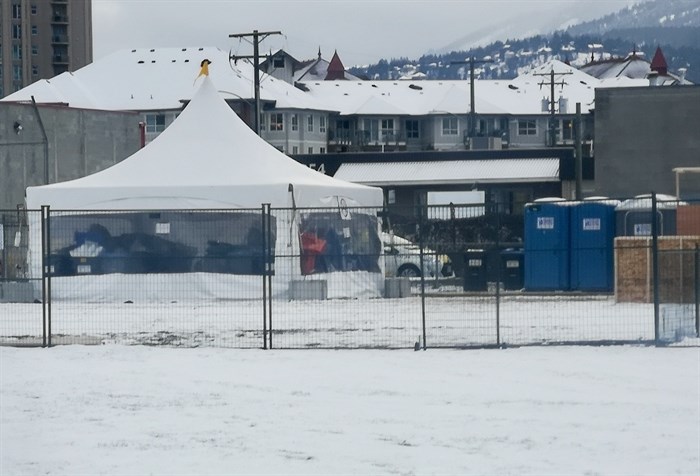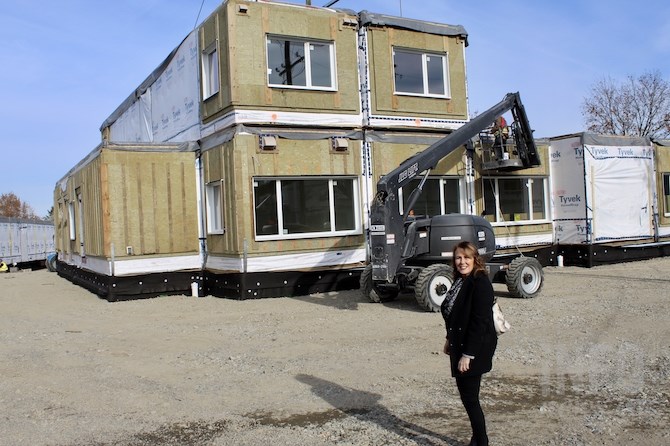
The warming shelter at the temporary homeless camping site on Recreation Avenue in Kelowna is pictured on Monday, Dec. 3, 2019, in this submitted photo.
Image Credit: SUBMITTED / Dennis Zahara
December 03, 2019 - 10:00 AM
A City-owned downtown building will be used to shift 40 people out of the Kelowna Gospel Mission and Cornerstone shelters to make room for the homeless people camped out in the city’s North End.
Called “bridge” housing, the novel idea means the campers won’t be shifted to a new temporary shelter. Instead, those already in shelters who are best suited to live in the new McIntosh supportive housing complex when it opens in the spring will have a chance to show they are ready and willing to make changes in their lives by moving into a new facility on Fuller Avenue.
A letter was mailed to neighbours of the former Pathways Abilities Society at 555 Fuller Ave. on Friday, Nov. 29, informing them of the plans.
The idea came during a brainstorming session with the City, B.C. Housing and the John Howard Society, which will manage the new facility.
“I had said, look, we’re willing to step up because I’m going to have to hire for McIntosh pretty soon anyways,” Dawn Himer, executive director for John Howard told iNFOnews. “So, if you guys can find a place, we’ll be able to operate it.”
Last week, Mayor Colin Basran told iNFOnews.ca that one of the problems with opening an emergency winter shelter – besides finding a landlord willing to lease a building – was to find an operator who could staff it. That problem has been overcome.
Since Himer needs to hire for McIntosh, she’s already been recruiting the 40 staff members she needs.
Shifting people who have lived in the existing shelters for many months to Fuller will give the operators a chance to find the right mix to go into McIntosh, where they will each have their own small apartment instead of sleeping in dormitories.
B.C. Housing sees this as being less invasive to the surrounding neighbourhood, Himer said.
“I think part of their idea was, why don’t we get people who are moving forward and give them that sense of hope and say, if you work really hard on this, we’re willing to kind of move you guys first,” Himer said. “They’ll be part of the group that’s moving forward and it’ll be holding them to greater account too.”
The building does need some renovation work so it’s not planned to open until mid-December.
The letter to the neighbours, which B.C. Housing provided to iNFOnews.ca, says the facility will close on March 31. McIntosh is expected to be open by then.

Dawn Himer, Executive Director of the John Howard Society, went to watch the the first modular units being put in place for the McIntosh supportive housing project in October. It's expected to be open by the end of March to provide housing for those who will soon move into the Fuller "bridge" housing facility.
(ROB MUNRO / iNFOnews.ca)
The building is owned by the City but Pathways Abilities Society has plans to develop an affordable housing complex on the site.
When supportive housing projects were announced in other parts of the city over the past year, neighbours were concerned about drug use by residents and upset with B.C. Housing for not being upfront about the fact that people are allowed to use illegal drugs on site.
In the letter to the Fuller Avenue neighbours, B.C. Housing tackles that issue directly.
“Are people allowed to use drugs inside the housing?” the letter asks.
“BC Housing, Interior Health and the John Howard Society of Okanagan and Kootenay work from a Housing First principle," the letter continues. "The goal is to provide stable housing and then work with people to promote recovery and well-being. If we exclude people with substance use issues, they would remain on the street with deteriorating health."
“Harm reduction best practices, based on Interior Health’s guidance, would be followed within the housing in order to prevent overdoses. This means drug-use will be permitted on site however only in a designated area that would be monitored by staff and require safe-disposal of needles. Although we anticipate most drug-use will happen inside the housing, the society would be sweeping the streets daily for garbage as a courtesy to neighbours.”
Since the Gospel Mission and Cornerstone have been full for months, the city allowed a tent city to grow on Leon Avenue. At one point it was estimated 100 people lived there.
Last week, the City ordered them off the street and helped them move to a baseball diamond behind Kelowna Curling Club on Recreation Avenue. They are expected to pack up their tents and belongings by 9 a.m. each day, store them on site, then set up again after 7 p.m.
At last count, it was estimated 45 to 50 people were living there.
To contact a reporter for this story, email Rob Munro or call 250-808-0143 or email the editor. You can also submit photos, videos or news tips to the newsroom and be entered to win a monthly prize draw.
We welcome your comments and opinions on our stories but play nice. We won't censor or delete comments unless they contain off-topic statements or links, unnecessary vulgarity, false facts, spam or obviously fake profiles. If you have any concerns about what you see in comments, email the editor in the link above.
News from © iNFOnews, 2019